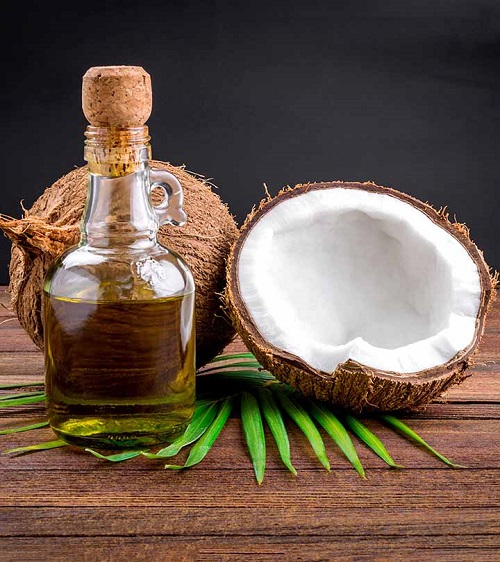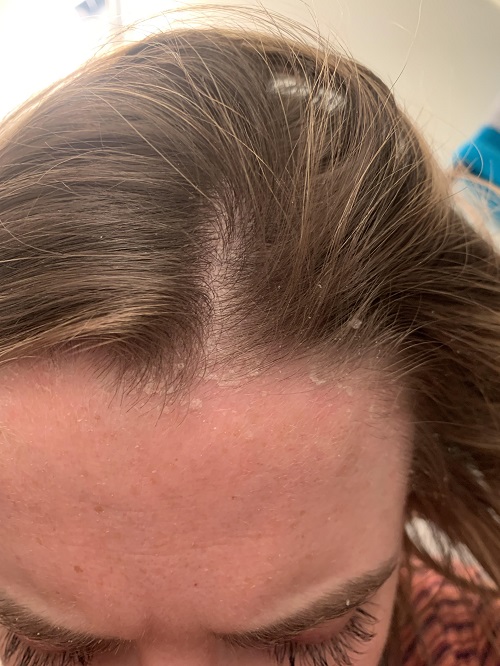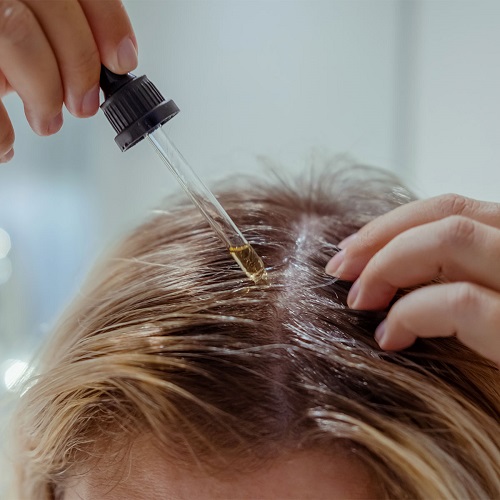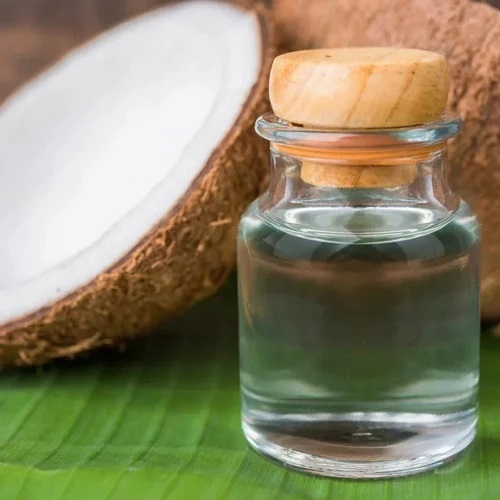Using coconut oil for dandruff can bring excellent results if you know the correct way to use it!

Our hair is not just a vital part of our appearance; it’s also a canvas for our personal style. However, maintaining it isn’t always easy. We frequently encounter issues like dryness, brittleness, and lack of shine. Common woes also include split ends and breakage. But the most pervasive hair challenge? You’ve guessed it—dandruff. In this article, we will explore how coconut oil can be a game-changer in your battle against dandruff.
What is Dandruff?
Most of us have encountered dandruff at some point, but understanding this common scalp condition is key to effectively managing it. Contrary to popular belief, dandruff isn’t just about a dry scalp shedding flakes. It’s primarily caused by an overproduction of oil on the scalp.
The real culprit behind dandruff is a fungus known as Malassezia globosa. This fungus thrives on the oils on your scalp, breaking them down into oleic acid. For over half of the world’s population, this acid triggers an adverse reaction, leading to symptoms like severe itching, redness, and the tell-tale flaking of dead skin cells.
Causes of Dandruff
While we know the actual culprit, the causes of dandruff are not just restricted to this fungus. Let’s explore other factors that lead to this worrisome condition.
- Malassezia: This yeast-like fungus naturally lives on our skin and thrives on oils from our hair and skin. But when it multiplies too much, it can cause dandruff, leading to symptoms like dry scalp, itching, and redness.
- Seborrheic Dermatitis: A more severe condition than regular dandruff, seborrheic dermatitis affects people with high levels of Malassezia. It often appears on oil-rich areas of the body and shares many signs with dandruff when it shows up on the scalp.
- Xerosis Cutis: This is a term for extremely dry skin, common in people in cold, dry climates and among the elderly. It can result from frequent hair washing, hot showers, prolonged sun exposure, or dehydration.
- Dermatitis or Nutritional Deficiencies: Eczema, psoriasis, or other forms of dermatitis can trigger dandruff. Nutritional deficiencies may also be responsible. An allergic reaction to new hair products could also be a culprit.
Does Coconut Oil Help with Dandruff?
Yes, coconut oil definitely helps fight dandruff with its moisturizing and other beneficial properties. While there are many remedies for dandruff, including over-the-counter (OTC) medications and prescription shampoos that contain zinc pyrithione, you may prefer the natural way, as chemicals can often increase dryness and scalp irritation. So here are the potential benefits of coconut oil for dandruff:
1. Boosts “Good” Bacteria
We’ve learned that a healthy fungal microbiome is vital for a healthy scalp, providing good bacteria and fungi that help hair follicles thrive. Sometimes, though, an overgrowth of a specific fungus called Malassezia can cause dandruff.
A 2021 study found that coconut oil can maintain the balance of beneficial bacteria and fungi while also reducing dandruff when it appears.
2. Reduces Inflammation and Adds Shine
Yet another study found that coconut oil can help reduce pain and inflammation in the scalp. It ultimately also alleviates itchiness associated with skin conditions like dandruff, psoriasis, and seborrheic dermatitis.
Besides that, coconut oil is rich in antioxidants and vitamin E that help strengthen your hair follicles and add shine, especially offering a layer of protection to colored hair.
3. Moisturizes and Boosts Scalp Health
A 2014 study on individuals with atopic dermatitis revealed that those who used coconut oil on their scalps benefited from its moisturizing effects and a reduction in moisture loss. Besides offering hydration that eases dandruff, coconut oil also helps tame frizzy hair and minimize split ends.
Its antimicrobial properties shouldn’t be overlooked either. Packed with fatty acids, coconut oil combats scalp irritation and dandruff flakes, while lauric acid specifically provides powerful antimicrobial benefits. This acid balances the scalp’s microbiome, soothing dryness and itchiness. All these qualities make coconut oil an exceptional remedy for dandruff.
How to Use Coconut Oil for Dandruff?
The most straightforward way to apply coconut oil is directly on your scalp. Here is how to do it the right way:
- Begin by warming up 1 to 2 tablespoons of coconut oil until it’s comfortably warm to the touch.
- Part your hair into sections and gently massage the oil directly onto your scalp. Use a comb to spread the oil evenly through your hair, making sure each strand is covered, especially if you have a dry scalp.
- Allow the oil to sit for about 30 to 60 minutes.
- Wash it out with your regular shampoo and continue with your usual hair care routine. For best results, repeat this treatment once or twice a week. Stick with it, and you’ll say goodbye to dandruff in no time!
Another fantastic way to utilize coconut oil and maximize its benefits is to create your own hair mask. However, before using natural ingredients on the scalp, consider your allergic profile. If you want to tap into its exceptional benefits, we have the best DIY coconut oil hair mask recipes for you!
Precautions to Consider
While coconut oil and its various combinations can be quite beneficial in tackling a dandruff problem, there are some factors you must be mindful of:
- Always start with a patch test before introducing coconut oil or any DIY hair treatments, especially if you have sensitive skin or known allergies.
- If your scalp tends to be oily, use coconut oil cautiously. It can actually make dandruff worse. If you notice more flaking, it might be best to consult a dermatologist.
- Not sure if home remedies are right for you, or is your dandruff getting out of hand? A dermatologist can provide personalized advice and treatment options.
- Coconut oil can help with dandruff, but it’s not a cure-all. Pair it with a dermatologist-recommended dandruff shampoo for the best results.
- Be aware that using coconut oil on an already oily scalp can increase irritation, particularly if you have seborrheic dermatitis. Keep an eye on how your scalp reacts and adjust your routine if necessary.
When To See A Doctor?
Generally, if you have dandruff, it is not a serious condition and will most likely resolve on its own. You can manage it at home, but in some extreme cases, you might need to contact a dermatology specialist.
- No home remedies, including (but not restricted to) coconut oil, have helped.
- You have tried many over-the-counter (OTC) medications and anti-dandruff shampoos for several weeks, but nothing has helped.
- If you’re dealing with severe dandruff, an extremely itchy scalp, or if you notice any redness, swelling, or open sores, it might be time to consult your dermatologist.
- If your immune system isn’t at its strongest, a professional can examine your scalp to pinpoint the exact cause of your dandruff. They will then diagnose the issue and develop a tailored treatment plan to address your specific needs.




